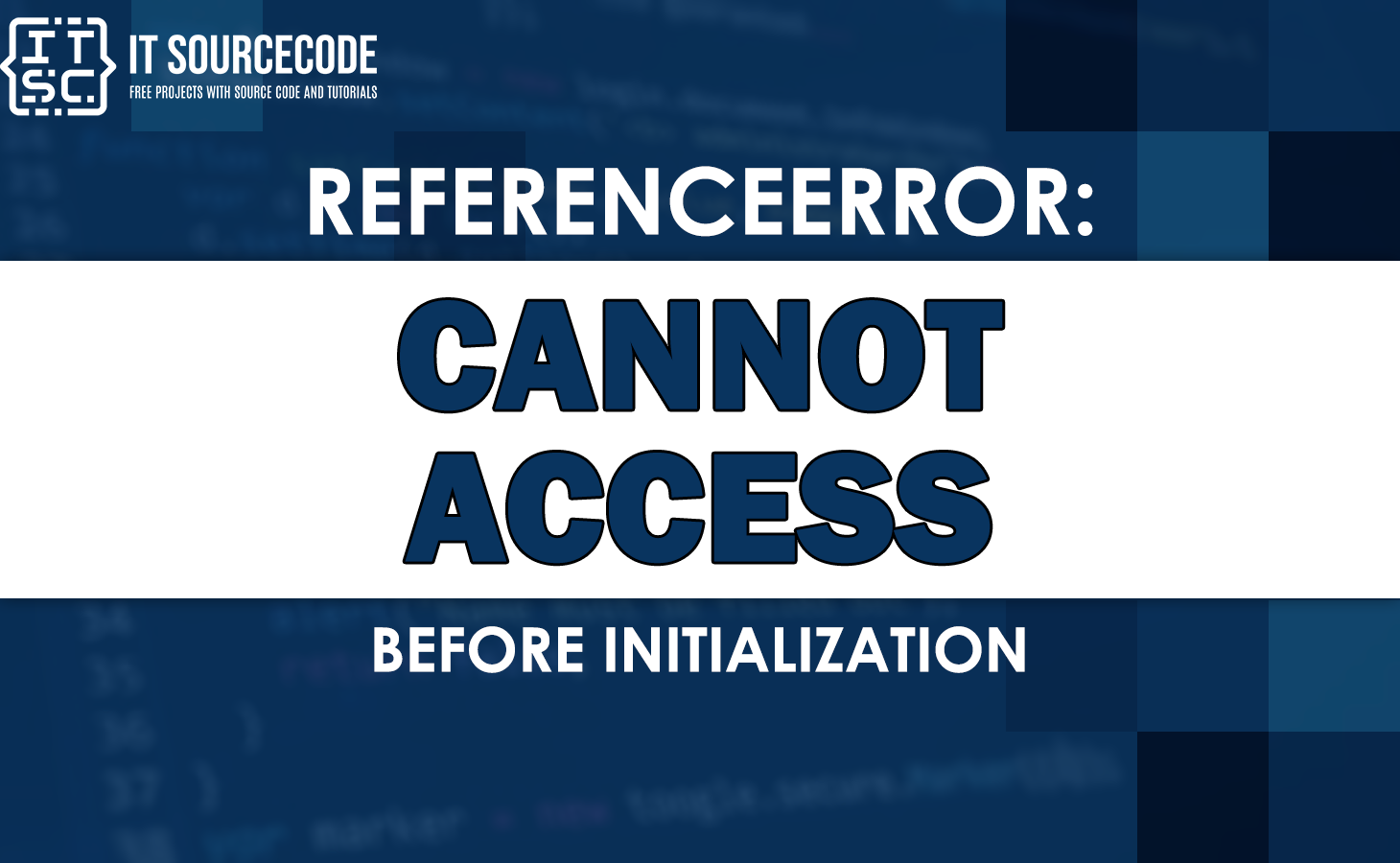In this article, we will delve into the intricacies of a common JavaScript error known as “ReferenceError: Cannot Access Before Initialization.”
We will explore the reasons behind this error and provide comprehensive solutions to help you resolve it effectively.
What is ReferenceError: cannot access before initialization?
The “ReferenceError: Cannot access before initialization” error happens when a variable declared with let or const is accessed before it has been initialized within the scope.
Here is how this error occurs:
// ReferenceError: Cannot access 'sampleArr' before initialization
sampleArr = [30, 20, 10];
let sampleArr = [10, 20, 30];
if (5 === 5) {
// ReferenceError:
console.log(num);
const num = 100;
}
function example() {
// ReferenceError:
console.log(str);
let str = 'itsourcecode.com';
}
// ReferenceError:
const result = sum(10, 50);
const sum = (a, b) => {
return a + b;
};Potential causes of ReferenceError
Variable Scope:
When using let or const keywords to declare a variable within a block or function, it becomes scoped to that block or function.
Accessing the variable before it is declared within that scope will cause an error.
Asynchronous JavaScript:
In asynchronous JavaScript, such as promises or async/await, the execution order can vary.
Accessing a variable or function that depends on asynchronous operations before it is initialized or resolved may lead to an error.
Hoisting:
In JavaScript, hoisting moves variable and function declarations to the top during compilation.
However, while declarations are hoisted, their initializations are not.
Attempting to access a variable before it is declared, even with hoisting, results in a “ReferenceError: Cannot Access Before Initialization” error.
How to fix the “ReferenceError: cannot access before initialization“?
Here are the following methods you may use to resolved this error:
Method 1: Initialize the variable before accessing it
The first way to resolve the error is to make sure to initialize the variables before utilizing them.
// use the let keyword before accessing the variable
let sampleArr = [10, 20, 30];
sampleArr = [30, 20, 10];
if (5 === 5) {
// use the const keyword before accessing the variable
const num = 100;
console.log(num);
}
function example() {
//use the let keyword before accessing the variable
let str = 'itsourcecode.com';
console.log(str);
}
// Define a function with the function keyword instead
const result = sum(10, 50);
console.log(result);
function sum(a, b) {
return a + b;
}The output would be:
100
60Variables declared with the keywords “let” and “const” are limited to the scope in which they are declared.
If you’re having trouble pinpointing the location of the error in your code, check the error message displayed in your browser’s console or Node.js terminal.
Method 2: Move the variable declaration to the top
Another way to solve the error is to move the variable declaration to the top of the if block.
Here is how the error occurs:
const sampleArr = ['car', 'ren', 'bea'];
if ('hi'.length === 2) {
// ReferenceError: Cannot access 'sampleArr ' before initialization
arr.push('test');
const sampleArr = [10, 20, 30];
}On line 1, we initialized the variable sampleArr and attempted to add a value to the array within the if statement.
Unfortunately, there is a conflicting declaration of sampleArr within the if block, resulting in an error.
The line sampleArr .push(‘test’) in the if block is intended to add a value to the numeric array specifically declared within the if block.
To fix this we have to move the variable declaration to the top of the if block.
const sampleArr = ['car', 'ren', 'bea'];
if ('hi'.length === 2) {
// Use a different variable name within the block to avoid conflicts
const anotherArr = [10, 20, 30];
// Access variable after
anotherArr.push('test');
console.log(anotherArr);
}
console.log(sampleArr);
We resolved the problem by declaring the variable sampleArr at the beginning of the if block.
It’s important to note that declaring a variable with the same name as one in the outer scope is generally discouraged.
The output would be:
[ 10, 20, 30, 'test' ]
[ 'car', 'ren', 'bea' ]Method 3: Leverage Hoisting
While hoisting can be a source of errors, it can also be utilized to your advantage.
By declaring your variables and functions at the top of their respective scopes, you can leverage hoisting effectively and avoid encountering the “ReferenceError: Cannot Access Before Initialization” error.
// Good practice: Utilize hoisting by declaring variables at the top
function sampleFunction() {
let sampleVariable; // Declaration
// ... Code that uses myVariable ...
sampleVariable = 'Initialized'; // Initialization
}
Method 4: Handle Asynchronous Operations Carefully
When dealing with asynchronous JavaScript, it is crucial to handle the order of execution properly.
Ensure that any dependent variables or functions are fully initialized or resolved before attempting to access them.
Example: Handling asynchronous operations with Promises
function getData() {
return new Promise((resolve, reject) => {
// Simulating an asynchronous operation
setTimeout(() => {
const data = 'Initialized';
resolve(data); // Resolve the Promise
}, 1000);
});
}
// Usage of the asynchronous function
async function myFunction() {
const myData = await getData(); // Wait for data initialization
// ... Code that uses myData ...
}Anyway besides this error, we also have here fixed errors that might help you when you encounter them.
- Uncaught ReferenceError google is not defined
- ImportError: cannot import name ‘parse_rule’ from ‘werkzeug.routing’
Conclusion
In conclusion, the “ReferenceError: Cannot Access Before Initialization” error can be resolved by understanding the underlying causes and applying the appropriate solutions.
By following best practices such as declaring variables at the beginning of their respective scopes, leveraging hoisting effectively, and handling asynchronous operations carefully, you can ensure seamless execution of your JavaScript code.
I think that’s all for this error. I hope you have gained something to fix their issues.
Until next time! 😊

